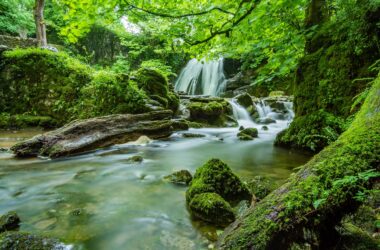Mawphlang Sustainable Tourism Practices: Mawphlang is a small village located in the East Khasi Hills district of Meghalaya, India. The village is known for its sustainable tourism practices and eco-friendly initiatives that have made it a popular destination for travelers seeking an authentic and environmentally responsible experience. In this article, we will explore Mawphlang’s sustainable tourism practices, including its efforts to preserve the environment, support the local economy, and promote cultural preservation.
Environmental Preservation
Mawphlang is situated in a region that is home to several endangered plant and animal species. To preserve the environment, the village has implemented various eco-friendly initiatives that minimize the impact of tourism on the environment. For instance, visitors are not allowed to bring any plastic bags or bottles into the village, and they must dispose of any waste in designated bins. The village also encourages visitors to use public transportation or bicycles instead of private vehicles, to reduce carbon emissions.
One of the most significant environmental preservation efforts in Mawphlang is the sacred forest. The sacred forest is a preserved woodland area that has remained untouched for centuries. The forest is considered sacred by the local Khasi people, who believe that it is home to ancestral spirits. The forest has several walking trails that visitors can use to explore the area while learning about the ecosystem and the Khasi culture.
Mawphlang’s sustainable tourism practices also extend to its accommodations. The village has several eco-friendly lodges that use renewable energy sources, such as solar power, and have implemented water conservation practices, such as rainwater harvesting.
Supporting the Local Economy
Mawphlang’s sustainable tourism practices not only benefit the environment but also support the local economy. The village has several initiatives that promote responsible tourism and support the local community. For example, visitors can take part in village tours, where they can learn about the local culture and interact with the Khasi people. These tours are conducted by local guides, who share their knowledge and expertise with visitors.
Another way Mawphlang supports the local economy is through its community-based tourism initiatives. The village has several homestays where visitors can stay with local families and experience the Khasi way of life. These homestays provide a unique cultural experience for visitors while also generating income for the local community. The village also has several handicraft shops where visitors can buy locally made souvenirs, such as traditional Khasi clothing and hand-woven baskets.
Mawphlang also has a farm-to-table initiative that supports local farmers and promotes sustainable agriculture. The initiative encourages visitors to sample locally grown produce, such as oranges, pineapples, and spices, and to learn about the traditional farming methods used by the Khasi people.
Preserving Cultural Heritage
Mawphlang’s sustainable tourism practices also include efforts to preserve the local cultural heritage. The village has several cultural initiatives that showcase the Khasi way of life and promote cultural exchange between visitors and the local community. For example, the village has a traditional Khasi dance performance that is held every evening. The performance features traditional music and dance that reflect the Khasi culture and history.
Mawphlang also has a community museum that showcases the local history and cultural heritage. The museum has several exhibits that display traditional Khasi clothing, handicrafts, and artifacts. Visitors can learn about the Khasi way of life and the history of the village through interactive displays and guided tours.
Another way Mawphlang promotes cultural preservation is through its language and education initiatives. The village has several language schools where visitors can learn the Khasi language and immerse themselves in the local culture. The schools are run by local teachers who use traditional teaching methods to promote language learning and cultural exchange.
Conclusion
Mawphlang’s sustainable tourism practices demonstrate that it is possible to have tourism that benefits both the local community and the environment. By implementing eco-friendly initiatives, supporting the local economy, and promoting cultural preservation, Mawphlang has created a tourism model that is both responsible and sustainable.
Mawphlang’s approach to sustainable tourism has gained recognition from both domestic and international tourists. It has become a popular destination for travelers seeking a unique cultural and eco-friendly experience. The village has received several awards and accolades, including the National Tourism Award for Best Eco-Tourism Destination in 2018.
However, Mawphlang’s sustainable tourism practices are not without their challenges. The village faces several issues such as inadequate waste management infrastructure, lack of access to funding, and low awareness among visitors about responsible tourism practices. The village has taken steps to address these challenges, such as partnering with government agencies and NGOs to improve waste management and infrastructure, and educating visitors about sustainable tourism practices.
In conclusion,
Mawphlang’s sustainable tourism practices serve as an example of how tourism can be a force for positive change. By prioritizing environmental preservation, supporting the local economy, and promoting cultural preservation, Mawphlang has created a tourism model that benefits both the local community and the environment. It is a model that other destinations can learn from and emulate, as we strive towards a more sustainable and responsible tourism industry.
Similar Articles
- Andaman and Nicobar Islands Sustainable Tourism
- Sikkim Sustainable Tourism Practices
- Kabini: Preserving Natural Beauty and Supporting Local Communities
- Chilika Lake: Preserving Biodiversity and Empowering Communities
Frequently Asked Questions About Mawphlang sustainable tourism practices
Q: What is sustainable tourism in Mawphlang?
A: Sustainable tourism in Mawphlang refers to tourism practices that minimize the negative impact of tourism on the environment and local communities while promoting responsible and culturally sensitive tourism. It includes initiatives such as environmental preservation, supporting the local economy, and promoting cultural preservation.
Q: What is the sacred forest in Mawphlang?
A: The sacred forest in Mawphlang is a preserved woodland area that has remained untouched for centuries. It is considered sacred by the local Khasi people, who believe that it is home to ancestral spirits. The forest is a significant environmental preservation effort in Mawphlang and has several walking trails that visitors can use to explore the area while learning about the ecosystem and the Khasi culture.
Q: What are the accommodations in Mawphlang?
A: Mawphlang has several eco-friendly lodges that use renewable energy sources, such as solar power, and have implemented water conservation practices, such as rainwater harvesting. The village also has several homestays where visitors can stay with local families and experience the Khasi way of life.
Q: What are the community-based tourism initiatives in Mawphlang?
A: Mawphlang has several community-based tourism initiatives that support the local community and promote responsible tourism. Visitors can take part in village tours, where they can learn about the local culture and interact with the Khasi people. The village also has several handicraft shops where visitors can buy locally made souvenirs, such as traditional Khasi clothing and hand-woven baskets.
Q: What cultural preservation initiatives are in Mawphlang?
A: Mawphlang has several cultural initiatives that promote cultural preservation and exchange. The village has a traditional Khasi dance performance that is held every evening, showcasing traditional music and dance that reflects the Khasi culture and history. The village also has a community museum that showcases the local history and cultural heritage, with exhibits displaying traditional Khasi clothing, handicrafts, and artifacts.
Q: How does Mawphlang promote sustainable agriculture?
A: Mawphlang has a farm-to-table initiative that supports local farmers and promotes sustainable agriculture. The initiative encourages visitors to sample locally grown produce, such as oranges, pineapples, and spices, and to learn about the traditional farming methods used by the Khasi people.
Q: What are the challenges faced by sustainable tourism in Mawphlang?
A: Mawphlang faces several challenges in implementing sustainable tourism practices, such as inadequate waste management infrastructure, lack of access to funding, and low awareness among visitors about responsible tourism practices. The village has taken steps to address these challenges, such as partnering with government agencies and NGOs to improve waste management and infrastructure, and educating visitors about sustainable tourism practices.
Q: Are there any eco-friendly activities for tourists in Mawphlang?
A: Yes, there are several eco-friendly activities that tourists can participate in while visiting Mawphlang. These activities include exploring the sacred forest, visiting the community museum, taking part in village tours, and trying locally grown produce. Tourists can also engage in activities such as birdwatching, hiking, and trekking while enjoying the natural beauty of the village.
Q: What kind of waste management initiatives are in place in Mawphlang?
A: Mawphlang has implemented several waste management initiatives to promote sustainable tourism practices. These initiatives include segregating waste, composting organic waste, and encouraging visitors to minimize their waste by carrying reusable bags and containers. The village has also partnered with government agencies and NGOs to improve waste management infrastructure, such as building public toilets and installing waste bins.
Q: How does Mawphlang support the local economy through tourism?
A: Mawphlang supports the local economy through tourism by promoting community-based tourism initiatives and encouraging visitors to purchase locally made products. The village has several handicraft shops and homestays where visitors can buy locally made souvenirs and stay with local families. Additionally, the village has a farm-to-table initiative that supports local farmers and promotes sustainable agriculture.
Q: How does Mawphlang educate visitors about responsible tourism practices?
A: Mawphlang educates visitors about responsible tourism practices through several initiatives, such as village tours and information centers. Visitors can learn about sustainable tourism practices and the local culture through the community museum and traditional dance performances. The village also encourages visitors to minimize their waste and conserve water by providing information and education materials at tourist information centers and eco-friendly accommodations.










